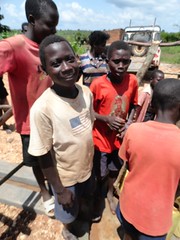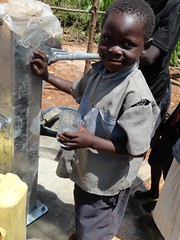Our implementing partner reports...
The village of Katamarwa lies in the open expanses of farmland in Uganda’s Kiryandongo District. Katamarwa’s people hail from within mid-western Uganda as well as from other parts of the country, including eastern Uganda and the West Nile region. Most residents of Katamarwa are farmers and maize is their dominant crop. Corn-based foods, along with beans and cassava form the basis of the local diet. After the harvest, residents sell surplus crops in the village market which find their way to places as far away as Kampala and Juba, which is the capital of South Sudan, the newest country in the world.
Life for the farmers in Katamarwa may be simple but it is also tough and health issues pervade the community. Lack of clean water is the single greatest contributor to poor health in the village. The village has over 300 households, some of which rely on a single protected well that was drilled in the 1960s. One village elder recalled moving to Katamarwa from the West Nile region in 1974 and has been drinking water from that well ever since. While reliable, the well is too far for many in the village to use. Katamarwa is a very spread out rural community, and so many families take their water from unprotected springs. These springs are completely open to the elements – which allow them to become contaminated from animal feces. The water is filthy and causes sickness for many people, particularly children, in Katamarwa
Busoga Trust has commenced work on a shallow well which will benefit many in this community. We estimate that when finished, this new water source will serve 250 people who today rely on contaminated water from the open springs. Village residents have contributed land and materials for this project and currently are working alongside a Busoga Trust technician to dig a well by hand. When they are finished, a high quality hand-pump will be installed which we expect will serve the community for as many years to come.


 Rehabilitation Project
Rehabilitation Project
















